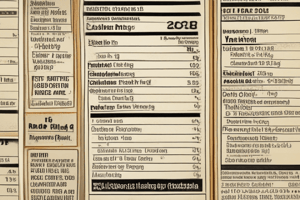Podcast
Questions and Answers
What is a calorie in terms of energy measurement?
What is a calorie in terms of energy measurement?
According to Wilbur O.Atwater, how many calories per gram do carbohydrates and proteins provide?
According to Wilbur O.Atwater, how many calories per gram do carbohydrates and proteins provide?
What is the primary factor that determines the daily calorie intake needed by an individual?
What is the primary factor that determines the daily calorie intake needed by an individual?
Which factor plays a significant role in how calories are produced and used in the body?
Which factor plays a significant role in how calories are produced and used in the body?
How can exercise impact basal metabolic rate (BMR)?
How can exercise impact basal metabolic rate (BMR)?
Why do individuals with more muscle mass tend to have a higher BMR?
Why do individuals with more muscle mass tend to have a higher BMR?
What role do nutrition labels play in helping consumers?
What role do nutrition labels play in helping consumers?
How do nutritional facts labels on food products help consumers?
How do nutritional facts labels on food products help consumers?
Flashcards are hidden until you start studying
Study Notes
- Nutritional facts labels on food products display information such as total fat, carbohydrates, protein levels, and more to help consumers understand the content of the food they are consuming.
- A calorie is a measure of energy, specifically a kilocalorie (kcal), which is the amount of energy needed to heat one kilogram of water by one degree Celsius.
- Wilbur O. Atwater developed a device in the late 1800s called a respiration calorimeter to measure the precise energy content in food, finding that carbohydrates and proteins provide four calories per gram, while fats provide nine calories per gram.
- The daily calorie intake needed varies based on gender, age, and activity level, with metabolism playing a significant role in how calories are produced and used in the body.
- Basal metabolic rate (BMR), which accounts for up to 70% of calories used by the body at rest, differs among individuals and can impact weight gain or loss.
- Exercise can increase BMR over time, contributing to higher energy expenditure, and individuals with more muscle mass tend to have a higher BMR.
- The nutrition label not only indicates calories but also details the amounts of fats, proteins, and carbohydrates in food products, helping consumers make informed choices about their diet to address issues like obesity and high fat/sugar intake.
Studying That Suits You
Use AI to generate personalized quizzes and flashcards to suit your learning preferences.




